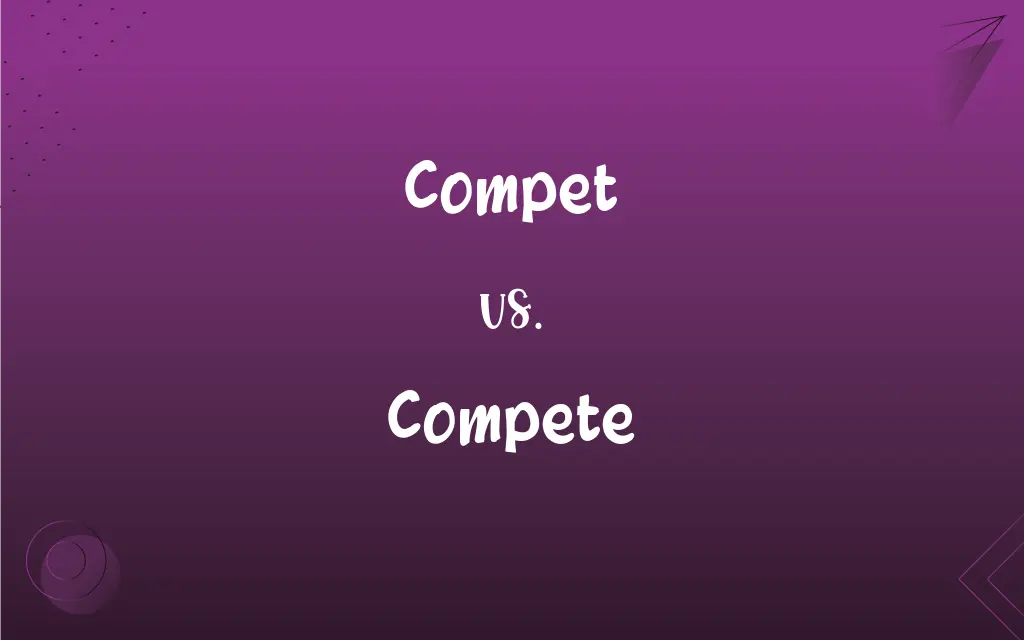Compet vs. Compete: Mastering the Correct Spelling
Edited by Aimie Carlson || By Harlon Moss || Published on March 22, 2024
"Compet" is incorrect spelling ; the correct spelling is "compete," meaning to strive against others for the purpose of achieving something.

Which is correct: Compet or Compete
How to spell Compete?

Compet is Incorrect

Compete is Correct
ADVERTISEMENT
Key Differences
The word "complete" minus the "l" helps remember the correct spelling for "compete."
Remember "compete" includes "pete," think of a person named Pete who competes.
Note that "compete" ends with "ete," which is unique compared to other incorrect versions.
Recalling "competition" can help you remember the correct spelling of "compete."
Associate "compete" with "meeting a competitor," focusing on the "ete" ending.
ADVERTISEMENT
Correct usage of Compete
He will compet in the national championships next month.
He will compete in the national championships next month.
They trained hard to compet at the highest level.
They trained hard to compete at the highest level.
Can small businesses compet with big corporations?
Can small businesses compete with big corporations?
She is excited to compet in her first marathon.
She is excited to compete in her first marathon.
The two teams will compet for the championship title.
The two teams will compete for the championship title.
Compete Definitions
To vie for superiority or victory.
Two companies compete for the largest market share.
To take part in a contest.
She will compete in a national spelling bee.
To enter into a rivalry.
He loves to compete in chess tournaments.
To strive against others for the purpose of achieving something.
Athletes compete in the Olympics to win medals.
To be capable of matching; contend on equal terms.
Small businesses struggle to compete with corporations.
To strive against another or others to attain a goal, such as an advantage or victory.
To be in battle or in a rivalry with another for the same thing, position, or reward; to contend
To be in a position in which it is possible to win or triumph.
To take part in a contest, game or similar event
To contend emulously; to seek or strive for the same thing, position, or reward for which another is striving; to contend in rivalry, as for a prize or in business; as, tradesmen compete with one another.
The rival statesmen, with eyes fixed on America, were all the while competing for European alliances.
Compete for something; engage in a contest; measure oneself against others
Compete Sentences
Students compete for scholarships every year.
To compete in this league, you must meet all the eligibility requirements.
Writers compete for prestigious literary awards.
Musicians compete in the contest to win a recording contract.
Scientists compete for research grants to fund their projects.
Startups compete by offering innovative solutions to common problems.
Athletes from around the world compete in the Olympics.
Chefs compete in cooking shows to showcase their skills.
Companies compete in the market to attract more customers.
Athletes compete against each other but respect their opponents.
Gamers compete in esports tournaments for large cash prizes.
Employees compete for promotions within a company.
Universities compete to be ranked highest in education quality.
Artists compete for gallery space to display their work.
Tech companies compete to develop the most user-friendly software.
Political candidates compete for votes during elections.
Students compete in science fairs with their innovative projects.
Actors compete for roles in films and television shows.
Environmental initiatives compete for public and private support.
Retailers compete on price, quality, and customer service.
Countries compete in the World Cup to prove they have the best soccer team.
Athletes compete not just for medals, but for personal bests.
Schools compete in academic decathlons, showcasing student talents.
Innovators compete to create the next big technology.
Entrepreneurs compete in pitch competitions to gain funding.
Compete Idioms & Phrases
Compete neck and neck
To be in a very close competition, with no clear leader.
The two runners were competing neck and neck until the very end of the race.
Compete on a level playing field
To compete under fair and equal conditions.
Small businesses struggle to compete on a level playing field with large corporations.
Compete against the odds
To compete despite facing significant challenges or disadvantages.
She competed against the odds and won the gold medal.
Compete for attention
When multiple things or people vie for someone's focus.
In the digital age, apps compete for users' attention constantly.
Compete under pressure
To perform or compete in a situation that involves a high level of stress or expectations.
The team showed they could compete under pressure by winning the final game.
Compete tooth and nail
To compete with all one's effort and determination.
The finalists competed tooth and nail for the championship title.
Compete in fair play
To engage in competition while adhering to the rules and showing respect to all participants.
The coach emphasized the importance of competing in fair play above winning.
Compete for market share
When companies vie for a larger portion of the industry's total sales.
Tech giants compete for market share with each new product release.
Compete with oneself
Striving to surpass one's previous achievements rather than focusing on beating others.
For her, running is about competing with oneself and constantly improving.
Compete on equal terms
To have an equal opportunity as others in a competition.
After years of training, she felt she could finally compete on equal terms with her rivals.
Compete by rules
To ensure that competition is conducted according to agreed-upon standards and regulations.
Fair competition requires all participants to compete by rules.
Compete in the big leagues
To compete at the highest level or with the best in a field.
After years of hard work, he's now competing in the big leagues of his profession.
Compete for the spotlight
When individuals or groups vie for the most attention or recognition.
In the film industry, actors often compete for the spotlight.
Compete from behind
To start a competition at a disadvantage or from a losing position.
The underdog team had to compete from behind but managed an incredible comeback.
Compete across borders
To engage in competition with participants from different countries.
The international tournament allows athletes to compete across borders.
Compete for glory
To compete with the aim of achieving fame and recognition.
Many athletes compete for glory, dreaming of standing atop the podium.
Compete with innovation
To use new and creative ideas to gain an advantage in competition.
Startups often compete with innovation, disrupting traditional markets.
Compete on merit
To be judged or to compete based on one's abilities and achievements.
The scholarship is awarded to students who compete on merit, demonstrating exceptional skills.
Compete for resources
When individuals or groups vie for limited materials or funding.
In the animal kingdom, species often compete for resources to survive.
Compete for a cause
To participate in a competition to support a charitable or social issue.
They competed for a cause, raising awareness and funds for environmental protection.
FAQs
Why is it called compete?
Derived from the Latin "competere," meaning to seek together, strive after together, or agree, hence the sense of striving against one another.
Which vowel is used before compete?
The letter "e" is used before "compete."
What is the pronunciation of compete?
The pronunciation of compete is /kəmˈpiːt/.
What is the root word of compete?
The root word is the Latin "competere."
What is the plural form of compete?
As a verb, it does not have a plural form.
Which preposition is used with compete?
"Against" and "with" are commonly used with compete (e.g., compete against, compete with).
Which article is used with compete?
Articles are not typically used directly with verbs.
What is the verb form of compete?
"Compete" itself is the base verb form.
What is the singular form of compete?
As a verb, "compete" does not change form between singular and plural.
Which conjunction is used with compete?
"And" is often used to connect subjects in competition (e.g., X and Y compete).
Is compete an abstract noun?
No, compete is a verb, not a noun.
Is compete a negative or positive word?
Compete is neutral; its connotation depends on the context.
Is compete a vowel or consonant?
The word "compete" contains both vowels and consonants.
Is the compete term a metaphor?
It can be used metaphorically to describe any form of rivalry or contest.
How do we divide compete into syllables?
Compete is divided as com-pete.
Is compete a countable noun?
Compete is not a noun; it is a verb.
What is another term for compete?
Another term for compete is "contend."
What is the second form of compete?
The second form is "competed" (past tense).
Is compete an adverb?
No, compete is not an adverb.
Is the word compete imperative?
"Compete" can be used in an imperative form as a command.
How many syllables are in compete?
There are two syllables in "compete."
What is a stressed syllable in compete?
The stressed syllable in "compete" is "pete."
What part of speech is compete?
Compete is a verb.
Which determiner is used with compete?
Determiners are not typically used directly with verbs.
Is compete a noun or adjective?
Compete is a verb.
Is compete a collective noun?
No, compete is a verb.
What is the opposite of compete?
The opposite of compete could be "cooperate."
What is the first form of compete?
The first form is "compete."
What is the third form of compete?
The third form is "competed" (past participle).
How is compete used in a sentence?
"Next summer, she plans to compete in her first marathon."
About Author
Written by
Harlon MossHarlon is a seasoned quality moderator and accomplished content writer for Difference Wiki. An alumnus of the prestigious University of California, he earned his degree in Computer Science. Leveraging his academic background, Harlon brings a meticulous and informed perspective to his work, ensuring content accuracy and excellence.
Edited by
Aimie CarlsonAimie Carlson, holding a master's degree in English literature, is a fervent English language enthusiast. She lends her writing talents to Difference Wiki, a prominent website that specializes in comparisons, offering readers insightful analyses that both captivate and inform.


































































